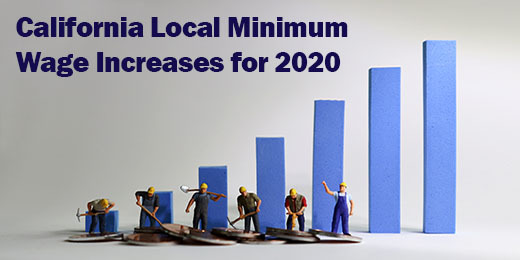2020 California Local Minimum Wage Increases

California has several cities and municipalities that have set their minimum wages at higher rates than the Federal or state level. As a reminder, on January 1, 2020, California’s minimum wage for employers with 26 or more employees will increase to $13.00 per hour. The minimum wage for employers with 25 or fewer employees will increase to $12.00 per hour.
The following municipal minimum wage increases will also take effect on January 1, 2020:
Belmont: $15.00
Cupertino: $15.35
Daly City: $13.75
El Cerrito: $15.37
Los Altos: $15.40
Menlo Park: $15.00
Mountain View: $16.05
Oakland: $14.14
Palo Alto: $15.40
Petaluma: $15.00 (26 or more employees); $14.00 (25 or fewer)
Redwood City: $15.38
San Diego: $13.00
San Jose: $15.25
San Mateo: $15.38
Santa Clara: $15.40
Sonoma: $13.50 (26 or more employees); $12.50 (25 or fewer)
South San Francisco: $15.00
Sunnyvale: $16.05
In preparation for the increases, review the rate table and perform a basic compensation analysis for other wage scenarios to avoid potential wage and hour risk.
Perform a Compensation Analysis
- Re-Calculate exempt employees salary requirements. To ensure it meets California state exempt employee salary requirements after the minimum wage increase. * Note: this is a CA state requirement for exempt employees. City Ordinances do not apply to the state salary threshold obligations. The state of California obligates employers to pay at least two times the state minimum wage for exempt employees. When state minimum wage increases, so must this salary threshold for exempt employees.
- Review Overtime/double-time and other pay calculations. Make sure they reflect all changes and amendments to the wage and hour laws (state and federal) effective January 1, 2020. Overtime/double-time, meal periods, weighted average and regular rates of pay for blended rates, etc.
- Adjust the minimum wage threshold for piece-rate, commission or other complex wage calculations.
Do not forget about the employees paid in alternative methods, for example, piece-rate, commission, bonuses etc. All non exempt employees, no matter the method and complex wage calculations performed, must earn at least the federal, state or local ordinance minimum wage requirement for all hours worked including overtime (if applicable according to hours worked).
How Can OnePoint Help?
Working with OnePoint puts all of your employee data, time and attendance, payroll and wage history in one place. Global system updates, including minimum wage for Federal, state and local levels, eliminates the need to update wage tables manually and automate accurate wage calculations to stay compliant. Quick reports provide current compensation rates for each of your employees. Run the base compensation history report and apply a filter to only display current rates to quickly verify pay rates.
Minimum Wage Changes
The state minimum wage rates discussed in this blog do not include county and city minimum wage rates. Also, this blog only covers updates from December 31, 2019 through July 2020 for states only.
This intended for market awareness only, it is not to be used for legal advice or counsel. Please access any number of public resources available to monitor changes to the minimum wage rate at the county or city level. Or consult with a labor law attorney for compliance questions.
Public Resources
Subscribe to updates
Get the latest posts delivered to your inbox.